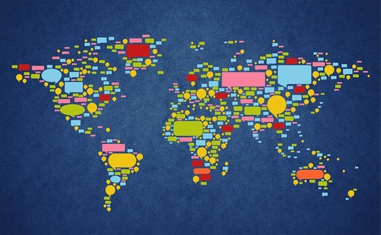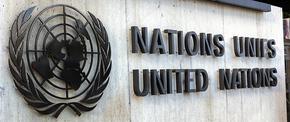The views expressed in our content reflect individual perspectives and do not represent the authoritative views of the Baha'i Faith.
Today in Starbucks here in Pittsburgh, I heard conversations across the three tables next to me in Persian, French, and Mandarin, in that order. We live in a multilingual world today.
As I write, a gentleman sitting behind me is talking on his cell phone in what sounds like Russian or another Slavic language. Here in the United States, I’ve heard more conversations today in other languages than I have in English!
It’s wonderful to hear all those languages, because it shows that the world has become a neighborhood and that we’re progressing closer than ever to global unity. No problem if there’s no need to understand what is being said. But if there is such a need, then there is definitely a problem.
RELATED: Uniting a Sustainable Humanity through a Universal Auxiliary Language
Wouldn’t communication be a lot easier if we could all understand each other?
Imagine it: others would appear less “foreign” in each other’s eyes. (Like beauty, foreignness is in the eyes of the beholder.) Everyone would feel more at home. In important undertakings, a common language spoken by everyone would prove extremely useful in peacemaking, in building cohesive communities, in business affairs, and in just about every other social context. In a talk he gave in New York City in 1912, Abdu’l-Baha said that Baha’u’llah, as one of the primary principles of his Faith:
… has declared the necessity for a universal language that it may serve as a means of international communication and thus remove misunderstandings. This teaching as to the importance of a universal language is set forth in [Baha’u’llah’s Most Holy Book], or “Book of Laws,” published fifty years ago.
In his “First Tablet to The Hague” written on December 17, 1919, Abdu’l-Baha clarified that principle:
… among the teachings of Baha’u’llah is the origination of one language that may be spread universally among the people. This teaching was revealed from the pen of Baha’u’llah in order that this universal language may eliminate misunderstandings from among mankind.
This Baha’i principle, expressed as a dynamic action, can be thought of this way: “Adopt a universal auxiliary language.” Here’s Baha’u’llah’s original passage from his Most Holy Book:
O members of parliaments throughout the world! Select ye a single language for the use of all on earth, and adopt ye likewise a common script. God, verily, maketh plain for you that which shall profit you and enable you to be independent of others. He, of a truth, is the Most Bountiful, the All-Knowing, the All-Informed. This will be the cause of unity, could ye but comprehend it, and the greatest instrument for promoting harmony and civilization, would that ye might understand! We have appointed two signs for the coming of age of the human race: the first, which is the most firm foundation, We have set down in other of Our Tablets, while the second hath been revealed in this wondrous Book.
Shoghi Effendi, the Guardian of the Baha’i Faith, stated that Baha’u’llah:
… in His Most Holy Book, has enjoined the selection of a single language and the adoption of a common script for all on earth to use, an injunction which, when carried out, would, as He Himself affirms in that Book, be one of the signs of the ‘coming of age of the human race.’
Baha’u’llah refers to the adoption of a universal language and world script as “the greatest instrument for promoting harmony and civilization,” while Abdu’l-Baha accords with this pronouncement in stating that a universal language “may eliminate misunderstandings from among mankind.”
Like the invention of Esperanto, introduced in 1887 by Polish linguist and physician Dr. Ludwig Lazarus Zamenhof (1859–1917) of Warsaw, in today’s Poland, the promotion and eventual adoption of a world language is essentially a secular process. But it is given profound religious significance in the form of a world-unifying Baha’i principle in a process of sacralizing the secular. Dr. Zamenhof’s daughter, Lidia Zamenhof, embraced the Baha’i Faith in or around 1925.
So what about the prophecy connected with this principle? In this celebrated passage, Abdu’l-Baha referred to this principle as the “seventh candle,” which is “unity of language” among the following prophecies:
Behold how its light is now dawning upon the world’s darkened horizon. The first candle is unity in the political realm, the early glimmerings of which can now be discerned. The second candle is unity of thought in world undertakings, the consummation of which will erelong be witnessed. The third candle is unity in freedom which will surely come to pass. The fourth candle is unity in religion which is the cornerstone of the foundation itself, and which, by the power of God, will be revealed in all its splendor. The fifth candle is the unity of nations — a unity which in this century will be securely established, causing all the peoples of the world to regard themselves as citizens of one common fatherland. The sixth candle is unity of races, making of all that dwell on earth peoples and kindreds of one race. The seventh candle is unity of language, i.e., the choice of a universal tongue in which all peoples will be instructed and converse. Each and every one of these will inevitably come to pass, inasmuch as the power of the Kingdom of God will aid and assist in their realization
For a more detailed prophecy, let’s peer into that same crystal ball through which we have gazed before — a remarkable vision that never ceases to amaze and inspire me.
RELATED: One Language and One World Government
We are now “living at a time which may be designated as the period of the incubation of the World Commonwealth envisaged by Baha’u’llah,” according to Shoghi Effendi in The World Order of Baha’u’llah. In that context, Shoghi Effendi offered this exciting glimpse into a future Golden Age of world civilization as it relates to the adoption of a world language and script:
A world language will either be invented or chosen from among the existing languages and will be taught in the schools of all the federated nations as an auxiliary to their mother tongue. A world script, a world literature, a uniform and universal system of currency, of weights and measures, will simplify and facilitate intercourse and understanding among the nations and races of mankind.
So this key Baha’i principle and prophecy, in a nutshell, can be captured in a simple phrase coined by the Universal House of Justice: “World peace through world language.” Standing alone, adopting a world auxiliary language and script will not, in and of itself, bring about world peace. But it will certainly help. This is why a global second language should be our first priority.
You May Also Like
Comments

















Understanding each other's writing and speech, is what binary language and script is enabling. Therefore a logical conclusion is that binary language is the language and script the writings are here referring to. The adoption of a secondary language that all people in the world will learn and speak will be overtaken by devices ...that will make it possible to hear, talk and understand each others language even with our own voice.
I wonder if we are perhaps thinking of this the wrong way. While we most certainly don't know what will actually be chosen in the future, what if the words 'spoken' and 'written' are not interpreted as strictly literally as we might imagine they are from plain sight?
What if the future Universal Auxiliary Language is - a language of the MIND ?